1 Volumes
Surviving Strands of Quakerism
Of the original thirteen, there were three Quaker colonies, all founded by William Penn: New Jersey first, Pennsylvania biggest, and Delaware so small Quakerism was overcome by indigenous Dutch and Swedes.
Quaker Business
New topic 2016-12-04 04:11:17 description
William Penn and the Corporate Model
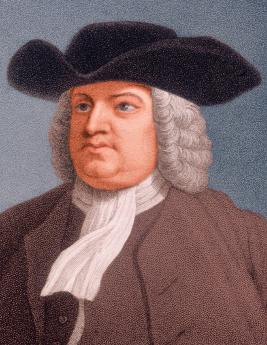
|
| William Penn |
The Proprietorship of West Jersey is pretty much unchallenged as the oldest surviving stockholder corporation in America. A number of points could be made about this creation, but an essential one is that Penn had very few existing models to work from. Nowadays, there are thousands of corporations in existence all over the world, many of them started by men of very little education or notable intelligence. Now that the subject has been mentioned, I can confess that I started three of them, myself. As I recall, it required only an hour's visit to a lawyer's office, for an agreed fee of $500 for each one of them, and after a two-week delay, I was said to be in business.
By contrast, consider Penn's problem. He had to conceive of the idea, and decide to go forward with it in spite of probably having almost no association with any other corporation, and probably without any assistance from any lawyer who had useful experience. While it is unlikely that he designed the modern corporation, or even contributed many useful design ideas, it is also likely he was so unaware of the known features of corporate design that he was nearly in the position of re-inventing this wheel if he expected it to succeed.
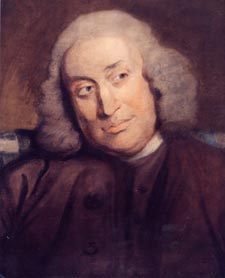
|
| Samuel Johnson |
Nowadays, a lot of entrepreneurs are in a similar state of innocence about corporate structure, but the models exist and the rules have been made and tested. An hour's conference with an accountant and a lawyer is all that is needed to avoid a million pitfalls, simply setting out on a well-trodden path. A modern businessman may go to business school and emerge with the complaint that he was not taught anything very useful, but that is far from the case. An entrepreneur doesn't need to know much about accounting, or corporate law, or tax law, or personnel management. But he does need to know that he needs the services of an accountant, a lawyer, a tax expert, and an office manager. These experts exist and provide their services as a reliable package. Back in the Seventeenth century, those professions didn't exist, and it was scarcely common knowledge that the corporation couldn't function without a number of working parts. The skill of supervision, some concept of how to find and manage capable subordinate leaders, how much to pay them, all fell to the pioneer to discover. In Penn's case, he had to have a reliable organization in order to manage, even to police, the day-to-day complexities of a staff of people going about their duties, while he went about his own. His personal chores included making personal arrangements with the King of England to acquire what has become three states: New Jersey, Pennsylvania, and Delaware; it required negotiations with the Indians, and with New York, Maryland and Virginia about their disputes with him. He had to organize the Assembly, deal with the major stockholders, and worry about wars and uprisings three thousand miles away.
As Samuel Johnson observed about a dog walking on two hind legs, the remarkable thing was not that he did it well, but that he did it at all.
Quakerism and the Industrial Revolution
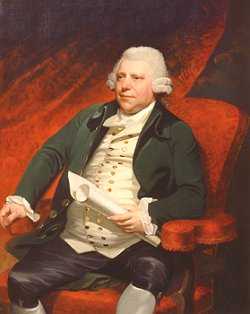
|
| Richard Arkwright |
The Industrial Revolution had a lot to do with manufacturing cotton cloth by religious dissenters in the neighborhood of Manchester, England in the Eighteenth Century. What needs more emphasis is the remarkable fact that Quakerism and the Industrial Revolution both originated about the same time, in about the same place. True, the industrializing transformation can be seen in England as early as 1650 and as late as 1880. The Industrial Revolution thus extended before Quakerism was even founded, as well as long after most Quakers had migrated to America. No Quaker names are much mentioned except perhaps for Barclay and Lloyd in banking and insurance, and Cadbury in candy. As far as local history in England's industrial midlands is concerned, the name mentioned most is Richard Arkwright, whose behavior, demeanor and beliefs were anything but Quaker.
He seems to have invented nothing, stealing the patents and ideas of others freely, while disgustingly boasting about his rise from rags to riches. Some would say his skill was in the organization, others would say he imposed an industrial dictatorship on a reluctant agricultural community. He grew rich by coercing orphans, convicts and others he obviously disdained into long, unpleasant, boring and unwelcome labor that largely benefited him, not them. In the course of his strivings, he probably forced Communism to be invented. It is no accident that Karl Marx wrote the Communist Manifesto while in Manchester visiting his friend Friedrich Engels, representing reasonably well the probable attitudes of Arkwright's employees. What Arkwright recognized and focused on was that enormous profits could flow from bringing piecework weaving into factories where machines could do most of the work. Until his time, clothing was mostly made by piecework at home, with middlemen bringing it all together. The trick was to make clothing cheaper by making a lot of it, and making a bigger profit from a lot of small profits. Since the main problem was that peasants intensely disliked indoor confinement around dangerous machines, the industrial revolution in the eyes of Arkwright and his ilk translated into devising ways to tame such semi-wild animals into submission. For their own good.
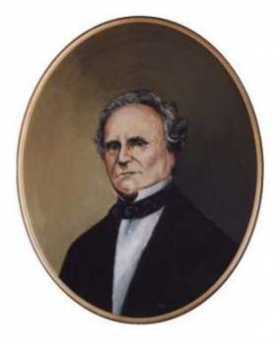
|
| Charles Babbage |
Distinctive among the numerous religious dissenters in the region, the Quakers taught that it was an enjoyable experience to sit indoors in quiet contemplation. Their children were taught to submit to it at an early age, and their elders frequently exclaimed that it was a blessing when everyone remained quiet, enjoying the silence. Out of the multitude of religious dissenters in the first half of the Seventeenth century, three main groups eventually emerged, the Quakers, the Presbyterians, and the Baptists. Only the Quakers taught that silence was productive and enjoyable; the Calvinist sects leaned toward the idea that sitting on hard English oak was good for the soul, training, and discipline was what kept 'em in line.
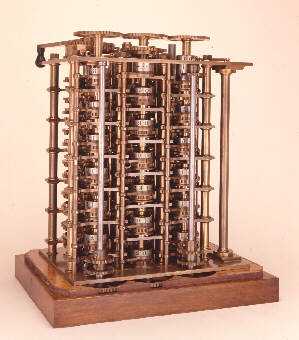
|
| babbagemaq.jpg |
The Quaker idea of fun through daydreaming was peculiarly suitable for the other important feature of the Industrial Revolution that Arkwright and his type were too money-centered to perceive. If workers in a factory were accustomed to sit for hours, thinking about their situation, someone among them was bound to imagine some small improvement to make life more bearable. If such a person was encouraged by example to stand up and announce his insight, eventually the better insights would be adopted for the benefit of all. Two centuries later, the Japanese would call this process one of continuous quality improvement from within the Virtuous Circle. In other cultures, academics now win professional esteem by discovering "win-win behavior", which displaces the zero-sum or win/lose route to success. The novel insight here was that it has become demonstrably possible to prosper without diminishing the prosperity of others. In addition, it was particularly fortunate that many Quaker inhabitants of the Manchester region happened to be watchmakers, or artisans of similar trades that easily evolved into the central facilitators of the new revolution -- becoming inventors, machine makers and engineers.
The power of this whole process was relentless, far from limited to cotton weaving. When Charles Babbage sufficiently contemplated the punched-cards carrying the simple instructions of the knitting machines, he made an intellectual leap to the underlying concept of the tabulating machine. Using what was later called IBM cards, he had the forerunner of the stored-program computer. There were plenty of Arkwrights getting rich in the meantime, and plenty of Marxists stirring up rebellion with the slogan that behind every great fortune is a great crime. But the quiet folk were steadily pushing ahead, relentlessly refining the industrial process through a belief in welcoming the suggestions of everyone.
John Head, His Book of Account, 1718-1753
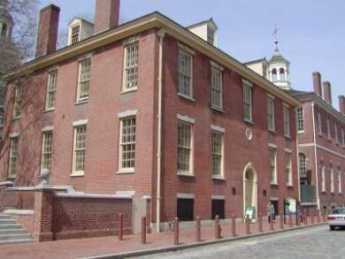
|
| American Philosophical Society |
Jay Robert Stiefel of of the Friends Advisory Board to the Library of the American Philosophical Society entertained the Right Angle Club at lunch recently, and among other things managed a brilliant demonstration of what real scholarship can accomplish. It's hard to imagine why the Vaux family, who lived on the grounds of what is now the Chestnut Hill Hospital and occasionally rode in Bentleys to the local train station, would keep a book of receipts of their cabinet maker ancestor for nearly three hundred years. But they did, and it's even harder to see why Jay Stiefel would devote long hours to puzzling over the receipts and payments for cabinets and clock cases of a 1720 joiner. Somehow he recognized that the shop activities of a wilderness village of 5000 residents encoded an important story of the Industrial Revolution, the economic difficulties of colonies, and the foundations of modern commerce. Just as the Rosetta stone told a story for thousands of years that no one troubled to read, John Head's account book told another one that sat unnoticed on that library shelf for six generations.
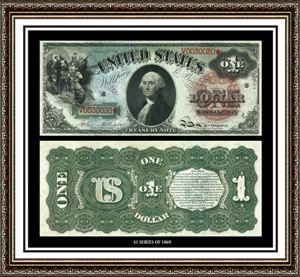
|
| Colonial Money |
The first story is an obvious one. Money in colonial days was mainly an entry in everybody's account book; today it is mainly an entry in computers. In the intervening three centuries, coins and currency made an appearance, flourished for a while as the tangible symbol of money, and then declined. Although Great Britain did not totally prohibit paper money in the colonies until 1775, in John Head's day, from 1718 to 1754, paper money was scarce and coins hard to come by. Because it was so easy to counterfeit paper money on the crude printing presses of the day, paper money was always questionable. Meanwhile, the balance of trade was so heavily in the direction of the colonies that the balance of payments was toward England. What few coins there were, quickly disappeared back to England, while local colonial commerce nearly strangled. The Quakers of Philadelphia all maintained careful books of account, and when it seemed a transaction was completed, the individual account books of buyer and seller were "squared". The credit default swap "crisis" of 2008 could be said to be a sharp reminder that we have returned to bookkeeping entries, but have badly neglected the Quaker process of squaring accounts. As the general public slowly acquires computer power of its own, it is slowly recognizing how far the banks, telephone companies, and department stores have wandered from routine mutual account reconciliation.
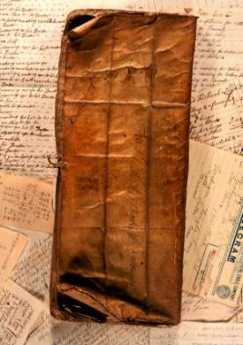
|
| John Head's Account Book |
From John Head's careful notations we learn it was routine for payment to be stretched out for months, but no interest was charged for late payment and no discounts were offered for ready money. It would be another century before it became routinely apparent that interest was the rent charged for money and the risk of intervening inflation, before final payment. In this way, artisans learned to be bankers.
And artisans learned to be merchants, too. In the little village of Philadelphia, chairs became part of the monetary system. In bartering cabinets for the money, John Head did not make chairs in his shop at 3rd and Mulberry (Arch Street) but would take them in partial payment for a cabinet, and then sell the chairs for the money. Many artisans made single components but nearly everyone was forced into bartering general furniture. Nobody was paid a salary. Indentured servants, apprenticeships trading labor for training, and even slavery benignly conducted, can be partially seen as efforts to construct an industrial society without payrolls. Everybody was in daily commerce with everybody else. Out of this constant trading came the efficiency step for which Quakers are famous: one price, no haggling.
One other thing jumps out at the modern reader from this book of account. No taxes. When taxes came, we had a revolution.
www.Philadelphia-Reflections.com/blog/1517.htm
J. Edgar Thomson, Pres. PRR 1852-1874
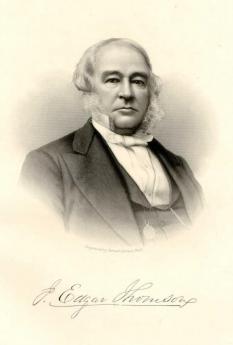
|
| J Edgar Thomson |
The third president of the Pennsylvania RR converted a local Philadelphia line into a national railroad, the largest corporation in the world. Thomson, born in the Quaker country of Springfield, Delaware County, was the son of a chief engineer of the Delaware-Chesapeake Canal and had worked closely with his father. After an introduction to the rail business, he worked on four other railroads before joining the Pennsy at the age of 29. The State of Pennsylvania had by then constructed a series of unsuccessful canals along most of its important waterways during the Whig days of faith in government, but Thomson knew canals very well and recognized that their rights of way were best transformed into rail lines. By acquiring these unprofitable companies, he rapidly changed the PRR into a state-wide rail network, of which the famous Horseshoe Curve at Altoona was the most notable achievement. From there he moved to convert wood-burners into the coal-burning locomotives developed in Philadelphia and shifted from iron rails to steel ones. The probably unexpected effect was to convert all railroads in the nation into customers of steel and coal, Pennsylvania's main resources. Andrew Carnegie was so pleased he renamed his main steel company into the J. Edgar Thomson Works.
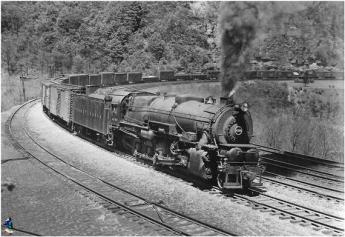
|
| Steam Engine on The Horseshoe Curve |
Thomson was quiet and conservative, never engaging in the high-jinks so characteristic of the rail barons of that day, leasing land rather than buying it whenever possible, expanding steadily but methodically, and never confusing revenue growth with profits. By 1870, Pennsylvania had expanded to a Jersey City terminus at New York harbor, and Chicago and St. Louis at the western ends. Within Pennsylvania, the line had expanded from 250 miles of track to over 6000. It was the largest corporation in the world. Underneath all this expansion was the Thomson system of decentralized management, essentially consisting of giving local control to division superintendents, but standardizing the corporation to superior approaches as they surfaced among the networked superintendents. His was a brilliant synthesis of the precision of an engineer combined with the cooperative sharing of a Quaker meeting. It was easy to describe but difficult to imitate, particularly by executives who boasted lifelong avoidance of the approaches of both the engineering profession and the cooperative diffident Quakers, in favor of swashbuckling, overborrowing, and muscle -- so popular at the time of the Gilded Age.
Thomson's fortune grew to seven or eight million dollars. While that was both comparatively modest by railroad standards and yet extremely affluent for the times, at his death, he had mostly given it to charity.
Quaker Efficiency Expert: Frederick Winslow Taylor 1856-1915

|
| F.W. Taylor |
For at least seventy-five years after Fred Taylor turned it down, any rich smart Philadelphia Quaker attending Phillips Exeter would have been automatically admitted to Harvard. We don't know why he did it, but instead F.W. Taylor just walked a few blocks down the hill from his Germantown house and got a job at the Midvale Steel Company as an apprentice patternmaker. During the twelve years, while he rose to become chief engineer of the company, he took a correspondence course for a degree in mechanical engineering at Stevens Institute and invented a process for making tungsten steel, called high-speed steel. That made Midvale Steel rich, but Taylor was going to make Philadelphia rich, and after that, he was going to make America rich. When he died, he was widely hated.
Evidently his lawyer father greatly admired German efficiency, having sent little Freddy to a famous Prussian boarding school where he was in attendance at the time of the
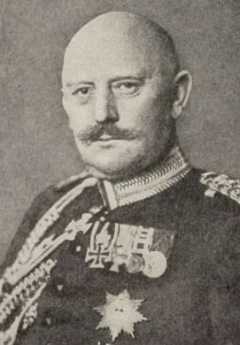
|
| General von Moltke |
Battle of Sedan. General von Moltke had used Prussian efficiency and discipline to defeat those indolent lazy French, and Fred Taylor evidently absorbed and retained these stereotypes for the rest of his life. Whatever he was looking for at Midvale Steel, what shocked him most was to find workers "soldiering on the job". That's a Navy term, by the way, invented by sailors to describe the useless shipboard indolence of any Army they were transporting. Taylor later went to Bethlehem steel, reduced the number of yard workers from 500 to 180, and was promptly fired. It seems that most of the foremen at the plant were owners of local rental houses, which were emptied of tenants when Taylor reduced the workforce. Even management came to mistrust Taylor. When the railroads wanted a rate increase, Louis Brandeis defeated them with the argument that they wouldn't need higher rates if they adopted Taylor's system of efficiency. In his later years after he became enormously rich, he toured the country giving speeches without fees, promoting the doctrine of finding the one best way and then doing everything that way.
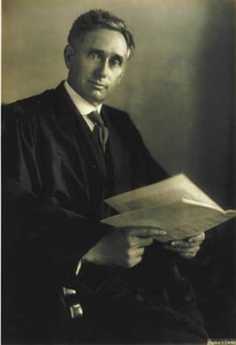
|
| Louis Brandeis |
Over time, Frederick Taylor had come to see that the industrial revolution had proceeded to the factory stage by merely bringing craftsmen indoors, each one treasuring his little trade secrets. Bringing the point of view of the company's owners onto the shop floor, Taylor could see how vastly more profitable the steel company would be if all those malingering tradesmen would stop soldiering on the job. No doubt the young Quaker soon learned that little was to be accomplished by remonstrating with workers, just as bellowing foremen had learned that bullying was also useless. Out of all this familiar scene emerged Taylorism, the idea of paying financial incentives to those who produced more, splitting the rewards of efficiency with the management. It sort of worked, but it didn't work enough to satisfy F.W. Taylor. When he walked around with a stopwatch, he collected the data showing how much more might be produced if the workers were perfectly efficient. Not only did that create the stereotype of the stop-watch efficiency expert, but it also provoked Congressional hearings and federal law against stopwatches which stayed on the books from 1912 to 1949. Although management responded by forming dozens of Taylor Societies to honor the approach, the unions invented the term "Taylorism" and bandied it about as the worst sort of epithet. Curiously, the Taylor approach proved to be enormously appealing both to Lenin and Stalin, who applied it as a central part of their five-year plans and general approach to industrialization. As we now all recognize, the Communist approach was a two-tier system instead of the three-tier system that was needed. It isn't enough to have a class of comrades called planners and another called workers; you need a layer of foremen, sergeants and chief petty officers in the middle. In addition to the elaborate time and motion studies leading to detailed written procedures, there needs to be an institutional memory for the required skills of the trade. In a funny sort of way, Fred Taylor the Quaker may have organized the downfall of the communist state before it was invented.

|
| Herbert Hoover |
Another peculiar outgrowth of Taylorism may be the partisan lines of our own political parties. If you trace the American ideological divide to the 1932 election of Franklin Roosevelt, you can see we are still fighting the battles of the depression. It happens that Herbert Hoover, another Quaker, was totally captivated by Taylorism. Not only that, he was adamant that to get rid of the depression all the country needed was to return to self-reliance, individual responsibility, and hard work. Those were qualities Hoover himself had in superabundance. One telling remark that he probably regretted saying but nonetheless firmly believed was, "If a man hasn't made a million dollars by the time he is forty, he can't amount to much." Franklin Roosevelt had the million all right, but his family had given it to him. The Cadburys and Clarks could have given it to Fred Taylor, too, but he chose to make it himself.
www.Philadelphia-Reflections.com/blog/1296.htm
Quaker Investment Committee
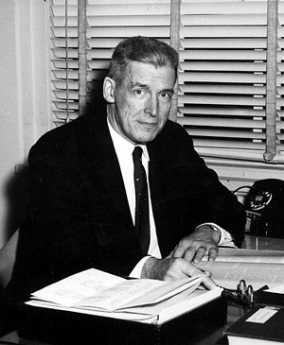
|
| Jonathan Rhoads |
Charitable institutions and other non-profit organizations occasionally assemble an endowment and thus develop a need for an oversight committee to hire (and occasionally fire) an investment manager, to monitor the fund's management, and to assess the manager's fees. The meetings of the oversight committee could, therefore, be pretty brief, related to two numbers. How had the endowment portfolio performed, compared with some acknowledged benchmark? To these two numbers might be added a brief summary of the investment management fees, compared with the usual benchmarks (40 basis points, or .4%, would be a common standard). However, an agenda so mercilessly sparse seems an inadequate reason to convene a group of worthies for an hour, and quite commonly the committee will chat about investments in general, hoping to pick up some personal pointers. A good tip or two makes the whole effort seem worthwhile.
On one such occasion in 1987, the famous Quaker surgeon Jonathan Rhoads, Sr was chairman of the committee. The manager of the endowment was a handsome fellow whose picture had occupied a full page of the New York Times financial pages just a day or two before this particular meeting. The picture had been truly spectacular, the tailoring was remarkable, and he surely had perfect teeth. As this gentleman entered the room, the committee gathered around, slapping his back and congratulating him on his fame with great jollity. Little did the group know that within thirty days, the stock market would have its most severe drop in almost twenty years. Unnoticed at first by the merry-makers, Jonathan Rhoads had sat down at the head of a perfectly empty long mahogany table, and was intoning to the empty seats, "We will now begin by reading the minutes of the last meeting of this committee". Visibly shaken, the group immediately broke up and took their seats.
Rhoads went on. We were now to hear the report of our portfolio by our manager. Proudly, it was noted that in February we had bought XYZ for 20, and in July we had sold it for 44. And in March we had bought ABCs for 60, and it now stands at 100. When he had concluded, the chairman said, "That's fine. That's just fine. But what bothers me is that point of confusion." Why, what confusion, Dr. Rhoads?
"The confusion between investment genius, and just being in a bull market." Later the same month, the stock market suddenly dropped 22% in one day, thus guaranteeing that no one in the room would ever forget the episode.
Puritan Boston & Quaker Philadelphia
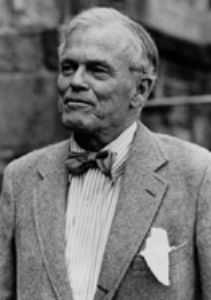
|
| Professor Digby Baltzell |
Digby Baltzell had something of the defiant rebel in him. He surely didn't imagine his employer, the University of Pennsylvania, was pleased to have him a document that Harvard is a better college than Penn. Nor were fellow members of the Philadelphia Club pleased to confront scholarship that his city's gentry was too devoted to money-making to accept the ardors of public leadership. Nor would his relatives in the Society of Friends enjoy accusations their religion impaired the pursuit of excellence in all fields of the city's endeavor. Later articles will here take up some unfair assaults, and defend Quaker simplicity and Peace Testimony. Some blame must, of course, be shared, some mitigating circumstances acknowledged. And let it be said in Baltzell's support that it truly is remarkable how many cultural features do get passed down for ten or more generations. Or even longer; look at the persistence of ancient Chinese, Indian, Esquimo, Viking, Roman, Christian and other cultural heritage. The Quakers got to Pennsylvania early, they are now vastly outnumbered. Many Quaker ideas continue to influence present inhabitants, some ideas probably hold us back. Substitute "Puritans of Boston" for "Quakers" in the foregoing sentence, and conclude by saying "some of those ideas probably give Bostonians an edge". Those two rather unexceptional declarations summarize a controversial book, although they do not completely capture its overall censorious flavoring.
To a certain extent, Digby is his own worst enemy. While alive, he was one of the world's most charming raconteurs, a walking encyclopedia of local lore. Like a good docent in a museum, he could walk into a room hung with portraits, and charm any audience for an hour; presumably, his sociology lectures at Penn held the same magnetism for his classes. In a book for popular readers, however, it is overdone to go on about the same point for six hundred pages. He needed a better editor, or perhaps he needed to permit a better editor to make him restrain his tendency to multiply illustrations beyond the point where the reader loses the thread of the argument. Not all readers will agree with his argument; they can only be legitimately defeated by focused argument. That's perhaps unrequired of college professors holding the power of grade-point averages over nineteen-year-olds, but it is expected of conversation with other adults. If an editor wants to sell books to a general bookstore audience, he should induce authors to overcome the take-it-or-leave-it habit.
As a general reaction to this book, Baltzell seems to think Quakers do not want to be rich and that consequently, latecomers into the region tend to share this feeling. My own view is that Quakers see they can have almost all of the value of being moderately rich -- by disdaining the trivial luxuries of the middle classes. They do not exactly renounce fame and power but are unwilling to gamble much or sacrifice much, in order to enjoy the comparatively small exhilaration of being very rich. They are now no longer surrounded by junior versions of themselves, but by bank-robbing Willie Suttons who readily attack Quakers for being where the money is, and appear to be pushovers at that. When Quakers then promptly demonstrate they are not pushovers at all, they are treated like outsiders in their own town. In many ways and at most times, the populist crowd gives up trying to understand Quakers and decides they must somehow always behave in ways that others would not. It's hard to achieve much deference in such an environment.
Many of Baltzell's important insights grew out of his position as a Philadelphia and academic insider; he personally knew many of the people he described. However, such an infiltrator runs the constant risk of being viewed as a tattle-tale, so a cover is required. Batzell's technique involved frequent use of quotations from others, not so much to prove a point as to rephrase it. This is another feature of the book which might have benefited from a hard-nosed editor. However this is how he wanted it, and in a post-publication revision, here is a condensation of how he summarizes his argument:
When studied with any degree of thoroughness, the economic problem will be found to run into the political problem, the political problem, in turn, run into the philosophical problem, and the philosophical problem itself to be almost indissolubly bound up at last with the religious problem.
--Irving Babbitt
In the South, ....left-wing Quakers came to the fore in the pine barrens of North Carolina-- to this day, North Carolinians speak of their state as "a valley of humilities between two mountains of conceit."
--E. Digby Baltzell
The world is only beginning to see that the wealth of a nation consists more than anything else in the number of superior men it harbors.
-- William James
I believe that ambitious men in democracies are less engrossed than any other with the interests and judgments of posterity; the present moment alone engages and absorbs them...and they are much more for success than for fame. What appears to me most to be dreaded, that in the midst of the small, incessant demands of private life, ambition should lose its vigor and its greatness.
-- Alexis de Tocqueville
Our rulers today consist of a random collection of successful men and their wives. ....They have been educated to achieve success, but few of them have been educated to exercise power. Nor do they count with any confidence upon retaining their power, nor of handing it on to their sons. They live therefore from day to day, they govern by ear. Their impromptu statements of policy may be obeyed, but nobody seriously regards them as having authority.
--Walter Lippmann
Equalitarians holding...extreme views have tended to believe that men of great leadership capacities, great energies or greatly superior aptitudes are more trouble than they are worth.
--John W. Gardiner
In the Jacksonian era in this country, equalitarianism reached such heights that trained personnel in the public service were considered unnecessary...Thus, in the West, even licensing of physicians was lax, because not to be lax was apt to be thought undemocratic.
--Merle Curti
In the late eighteenth century we produced out of a small population a truly extraordinary group of leaders-- Washington, Adams, Jefferson, Franklin, Madison, Monroe, and others. Why is it so difficult today, out of a vastly greater population, to produce men of that character?
--John W. Gardiner
It is nevertheless certain that the high quality of Virginia's political leadership in the years when the United States was being established was due in large measure to those very things which are now detested. Washington and Jefferson, Madison and Monroe, Mason, Marshall, and Peyton Randolph, were products of the system which sought out and raised to high office men of superior family and social status, of good education, or personal force, of experience in management: they were placed in power by a semi-aristocratic political system.
--Charles S. Syndor
Another clue to the relationship between hierarchy and leadership is suggested by Gardner's list of the Founding Fathers. All of these men were reared in Massachusetts or Virginia; none was reared in the colony of Pennsylvania, though Philadelphia was the largest city in the new nation and contained perhaps the wealthiest, most successful, gayest, and most brilliant elite in the land. Not only had Pennsylvanians little to do with taking the lead in our nation's founding, but the state has produced very few distinguished Americans throughout our history...I shall concentrate here on the commercial cities of Boston and Philadelphia, whose great differences in leadership and authority were far more likely to reflect differences in ideas and values.
--E. Digby Baltzell
Whatever else ...America came to be, it was also an experiment in constructive Protestantism.
--H. Richard Niehbur
All this is only to say that man is a product of his history, where nothing is entirely lost and little is entirely new.
--E. Digby Baltzell
For the wine of New England is ...more like the mother-wine in those great casks of port and sherry that one sees in the bodegas of Portugal and Spain, from which a certain amount is drawn off each year, and replaced by an equal volume of the new. Thus the change is gradual, and the mother wine of 1656 still gives bouquet and flavor to what is drawn in 1956.
--S.E. Morison
New Englanders, ambitious beyond reason to excell.
--Henry Adams
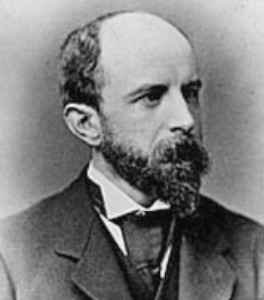
Henry Adams Pennsylvania became the ideal state, easy, tolerant and contented. If its soil bred little genius, it bred less treason. ... To politics, the Pennsylvanians did not take kindly. Perhaps their democracy was so deep an instinct that they knew not what do to with political power when they gained it; as though political power was aristocratic in its nature, and democratic power a contradiction in terms.
--Henry Adams
The reproach I address to the principles of equality is that it leads men to a kind of virtuous materialism, which would not corrupt, but would enervate the soul, and noiselessly unbend its springs of action.
--Alexis de Tocqueville
In our egalitarian age of mistrust, trustworthy men of great ability are increasingly refusing to run for public office or to serve in positions of authority and leadership in our society...In the rest of this book, I shall try to show how and why the Quaker city of Philadelphia, in contrast to Puritan Boston, has suffered from that virus of virtuous materialism for almost three centuries and how its best men, on the whole, have seldom sought public office or positions of societal authority and leadership outside business.
--E. Digby Baltzell
REFERENCES
| Puritan Boston and Quaker Philadelphia: E. Digby Baltzell. ISBN-13: 978-1560008309 | Amazon |
Quakers and Idolatry
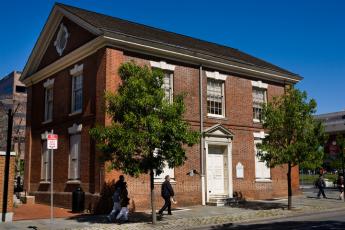
|
| Philadelphia's Quaker Meetinghouse |
There are about forty thousand bodies buried in Philadelphia's Quaker Meetinghouse grounds at Fourth and Arch Streets, which contain only two tombstones. The yellow fever epidemics of the era account for much of that, but it's nevertheless a striking portrayal of early Quaker aversion to anything resembling idolatry. It underlines this attitude by sharp contrast with more recent uproars about desecrating statues of Confederate generals in public spaces of the Old South, which even Robert E. Lee objected to constructing. They led plausibly to erecting and then defacing Union generals in Northern states as well; since it seemed natural for statue-desecration to evolve into an equal-opportunity demonstrations. A little primitive perhaps, but even-handed.
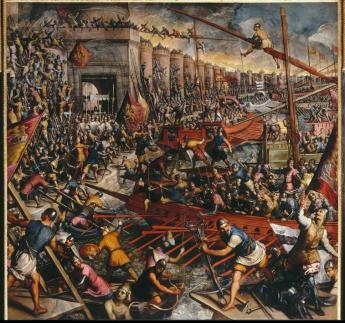
|
| The Fourth Crusade |
Worshiping graven images has a long history. You needn't be a public-statue expert to remember the terracotta Chinese soldiers are two thousand years old, and the Egyptian pyramids are even older. The chariot horses over the Brandenburg Gate make a stronger illustration of the idea, intertwined over the shorter length of Western civilization. Although carvings might be older, we also have a reasonably accurate history of the bronze statues of these horses. The technique evolved with different proportions of copper and tin, with other metals sometimes added, but the underlying idea is to make a hollow bronze statue, giving the appearance of a much heavier solid bronze one, apparently originating in the Greek islands off the coast of Turkey in the second Century. There were in fact two such statues, with different subsequent histories. The Fourth Crusade was the one where Western European Christian Crusaders invaded Constantinople the main eastern Christian capital, never getting to the Holy Land. Even if they started with good intentions, Christians were content to carry off Christian booty, including the bronze horses. One set was sent to Venice and the other set got to the Christians in Southern France.
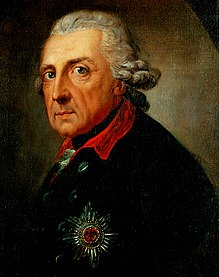
|
| Frederick the Great |
Frederick the Great put one set in the center of Berlin. In time, Napoleon took both statues to Paris, but later returned them. The one in Berlin, or perhaps copies of it eventually came to symbolize Nazi Germany, but later Checkpoint Charlie. The details of these conquests and adventures are not not of much consequence today, leaving only the central point that someone conquered someone else, and God must love the victor. The main point became victory, dogmas have been forgotten. Only the Quakers seem to be willing to mention another main point: Thousands of people died for these statues, but very few tourists could now tell you why. The Quakers reached a conclusion we might reconsider. Pulverize all statues and churches, thus saving the world from future grief. Since the Quakers also were first to free the slaves but later mostly disapproved of the Civil War, the irony was not lost on them. But most of their grandchildren reversed the assessment. It's too early to say how another generation will be persuaded to feel.

|
| General Lucius Clay |
During the War against Nazi Germany, my uncle was General Lucius Clay's room-mate, and the two of them were appointed to oversee de-Nazification of the defeated Germans by a third Pennsylvania Dutchman, Dwight Eisenhower. The concept was devised by Henry Morgenthau, then Secretary of the Treasury, in a famous letter urging a program to make Germany into an agricultural nation "for a thousand years". Accordingly, my father's brother oversaw the public burning of tons of postage stamps containing swastikas, plus every photograph of Adolph Hitler the Army could locate, along with similar symbols of the Third Reich. Nearly eighty years have passed since then -- essentially two generations, but it still remains illegal to possess such documents. Evidently, a sense of vengefulness so regularly outlasts its provocation, that passing the grievance on to children is usually hard to justify.
8 Blogs
William Penn and the Corporate Model
 Among his many accomplishments, William Penn created the oldest surviving stockholder corporation in America, now well over three hundred years old.
Among his many accomplishments, William Penn created the oldest surviving stockholder corporation in America, now well over three hundred years old.
Quakerism and the Industrial Revolution
 The Industrial Revolution extended over two centuries and was more important than all the wars, governments, and agitations of its time. Quakerism began at the same time, in the same place. Was that only coincidence?.
The Industrial Revolution extended over two centuries and was more important than all the wars, governments, and agitations of its time. Quakerism began at the same time, in the same place. Was that only coincidence?.
John Head, His Book of Account, 1718-1753
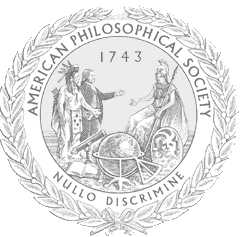 The equivalent of the rosetta stone for colonial commerce had been sitting on George Vaux's shelf for six generations.
The equivalent of the rosetta stone for colonial commerce had been sitting on George Vaux's shelf for six generations.
J. Edgar Thomson, Pres. PRR 1852-1874
 J. Edgar Thompson was a quiet Quaker engineer who expanded the Pennsylvania Railroad over the old canal system, shifted from wood to coal, organized the personnel structure to meet modern needs, and converted PRR from a local to a national railroad.
J. Edgar Thompson was a quiet Quaker engineer who expanded the Pennsylvania Railroad over the old canal system, shifted from wood to coal, organized the personnel structure to meet modern needs, and converted PRR from a local to a national railroad.
Quaker Efficiency Expert: Frederick Winslow Taylor 1856-1915
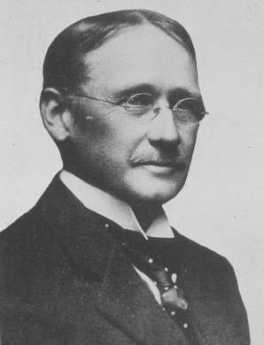 A rich Germantown Quaker boy became the world's symbol of the efficiency expert with a stop-watch, hated by Labor Unions but admired by Lenin and Stalin. He enriched the Midvale Steel Company with his invention of high-speed steel but was fired by Bethlehem Steel for eliminating too many employs. 000..0ees. Peter Drucker placed him in the class of innovators beside Darwin and Freud.
A rich Germantown Quaker boy became the world's symbol of the efficiency expert with a stop-watch, hated by Labor Unions but admired by Lenin and Stalin. He enriched the Midvale Steel Company with his invention of high-speed steel but was fired by Bethlehem Steel for eliminating too many employs. 000..0ees. Peter Drucker placed him in the class of innovators beside Darwin and Freud.
Quaker Investment Committee
 Quakers expect results from their investment managers, not just Wall Street gossip.
Quakers expect results from their investment managers, not just Wall Street gossip.
Puritan Boston & Quaker Philadelphia
 The University of Pennsylvania Sociology professor E. Digby Baltzell drew attention to the strong persistence of earlier elite influences, using Philadelphia's Quakers and Boston's Puritans as prime examples.
The University of Pennsylvania Sociology professor E. Digby Baltzell drew attention to the strong persistence of earlier elite influences, using Philadelphia's Quakers and Boston's Puritans as prime examples.
Quakers and Idolatry
 Early Quakers were so opposed to idolatry, they wouldn"t allow tombstones.
Early Quakers were so opposed to idolatry, they wouldn"t allow tombstones.